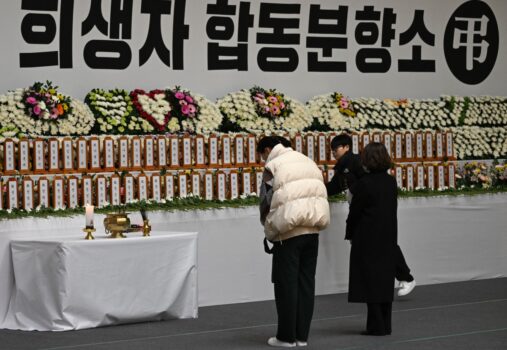 The departure hall of Muan International Airport in southwestern South Korea echoed with sobs, prayers, and anguish on Monday as families of the victims of Sunday’s catastrophic plane crash awaited identification of their loved ones. The crash of Jeju Air flight 7C 2216, which claimed 179 lives, is the deadliest aviation disaster in South Korea in nearly 30 years.
The departure hall of Muan International Airport in southwestern South Korea echoed with sobs, prayers, and anguish on Monday as families of the victims of Sunday’s catastrophic plane crash awaited identification of their loved ones. The crash of Jeju Air flight 7C 2216, which claimed 179 lives, is the deadliest aviation disaster in South Korea in nearly 30 years.
The Boeing 737-800 jet, carrying 175 passengers and six crew members, crash-landed at Muan Airport just after 9 a.m. local time on Sunday. Only two people—a male and female crew member—survived.
In the airport’s soaring atrium, grieving families gathered as medics announced the names of the 146 victims identified so far, leaving 33 yet to be named. Wrapped in embraces, many prayed while others, overcome by grief, demanded answers from officials. Yellow tents dotted the hall, providing overnight shelter for relatives waiting for updates.
Investigators are working to determine the cause of the crash. Officials confirmed the pilot had reported a bird strike and declared an emergency moments before attempting a landing. Kang Jung-hyun, a senior official at the Ministry of Land, Infrastructure, and Transport, said the pilot made a “mayday” call, reporting a bird strike and requesting a “go-around” to abort the landing attempt.
Footage of the crash shows the plane sliding on its belly, striking an embankment, and erupting in flames. Experts noted the plane’s landing gear appeared not to have fully deployed, an extremely rare occurrence.
Two black boxes, the flight data and cockpit voice recorders, have been recovered, though one has external damage. The devices have been sent to Seoul for analysis, with possible further examination in the United States. The U.S. National Transportation Safety Board (NTSB) is assisting with the investigation alongside South Korean authorities and Boeing engineers.
Authorities revealed the control tower had warned the pilot of bird activity in the area shortly before the mayday call. The crash occurred two minutes after the call. Despite the bird strike report, some aviation experts question whether it alone could have caused the disaster.
The pilot, who had 6,800 hours of flight experience and had held the position since 2019, is under review as investigators examine the plane’s maintenance history and operational protocols.
Acting President Choi Sang-mok declared seven days of national mourning and ordered a comprehensive inspection of all Boeing 737-800 aircraft in South Korea. A total of 101 planes from six airlines will undergo checks focusing on engines, landing gear, and maintenance records.
“We will transparently disclose the progress of the investigation and keep the bereaved families informed,” Choi said during a disaster control meeting. On Sunday, Choi visited the crash site, designating it a special disaster zone and offering condolences to victims’ families.
The tragedy comes amid political turmoil, as Choi assumed presidential duties only two days prior following the impeachment of Prime Minister Han Duck-soo and President Yoon Suk-yeol.
A public memorial altar has been set up in Muan, where mourners are leaving flowers and candles to honor the victims. The 179 fatalities include 84 men, 85 women, and 10 individuals whose genders have not yet been determined. Among the passengers were two Thai nationals, with the rest being South Korean citizens.
More than 700 personnel from the police, military, and coast guard are involved in recovery efforts. As the nation mourns, investigators and officials vow to uncover the truth behind this devastating tragedy.

White House Says Military Option Open On Greenland Acquisition
Trump Calls Case Against Maduro “Infallible” Ahead Of U.S. Court Appearance
South Africa Raids U.S. Refugee Processing Centre, Arrests Seven Kenyans
Time Magazine Names AI Visionaries ‘Person of the Year’